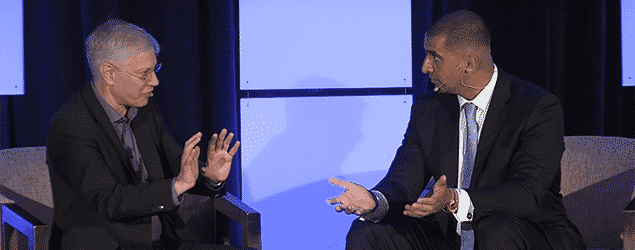Introducing Ayn Rand’s Ethics to European Philosophers

Aaron Smith, a philosopher at ARI, recently published an article on Ayn Rand’s ethics at the invitation of the editors of De Filosoof (The Philosopher), the quarterly magazine of the Department of Philosophy and Religious Studies at Utrecht University in the Netherlands.
“Ayn Rand: A New Concept of Egoism,” which begins on page 16 of the magazine’s most recent issue (available in full here), introduces Rand’s unique approach to self-interest in the context of the issue’s theme, “De Ander” (“The Other”).
Smith notes that although Rand champions a morality of selfishness, the heroes and heroines of her novels “do not fit the image of selfishness that most of us hold”:
Instead of a gallery of callous climbers and exploiters, we find inspiring individuals of integrity, purpose, and intelligence — artists, philosophers, industrialists, inventors, and businessmen — men and women who guide their lives by reason, who pursue productive careers and take pride in themselves, in their work, and in their capacity to live. Their central purpose is the achievement of their own happiness, but they are neither asocial nor anti-social. They have a deep respect for the rights of others, dealing with them by means of reason and trade, not by force or fraud. They have an elevated view of human potential and they admire and find inspiration in the achievements and virtues of others. They form deep friendships and romantic relationships, and their general outlook is one of benevolence and goodwill.
Explaining the stark contrast between Rand’s view of selfishness and the conventional one, Smith writes:
Rand argues that the conventional association of self-interest with callous exploitation and indifference toward others is not only false, it distorts the way we frame our moral alternatives and, as a result, how we evaluate ourselves and others, and how we fashion our institutions. For it conveys the idea that our alternatives in life are: sacrifice others for one’s own sake or sacrifice oneself for others’ sake. What Rand is offering, and what she projects in her novels, is a third alternative — a non-sacrificial approach to life. Only such an approach, she argues, is in our self-interest. What we need, therefore, is not to abandon self-interest or to pepper our lives with occasional acts of selflessness to give them a moral flavor; what we need is a new, rational conception of our interests. We need a morality of “rational selfishness.”
The article, which is worth reading in full, goes on to discuss what Rand means by “rational selfishness” and what her approach to morality entails for our relations with others.
[O]n a non-sacrificial view of human relations, one does not look upon others as perpetual collectors of sacrifices, but as potential values. She argued that other people can be a tremendous source of value, of personal selfish value to one’s own life and happiness — whether as friends or loved ones or simply people whose character makes them pleasant or inspiring to be around. So, far from there being a conflict between rational selfishness and a benevolent view of human relations, the former is in fact the grounds for the latter — and this is precisely what we find projected in Rand’s novels and argued for in her philosophical essays.
Smith, who earned his PhD in philosophy from Johns Hopkins University, is an instructor for ARI’s Objectivist Academic Center and its Summer Internship program. He writes and lectures for the Institute and develops educational content for ARI’s e-learning programs.
(Originally published on Objectivism: Who Needs It.)



